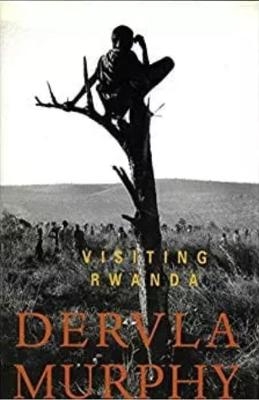
Visiting Rwanda
Seiten
1998
The Lilliput Press Ltd (Verlag)
978-1-901866-11-7 (ISBN)
The Lilliput Press Ltd (Verlag)
978-1-901866-11-7 (ISBN)
- Titel ist leider vergriffen;
keine Neuauflage - Artikel merken
Dervla Murphy has brought back extraordinary accounts of suffering and resilience among the survivors. She shows that the killing was not, as the world has generally assumed, the result of primitive tribalism, but rather a well-orchestrated genocidal campaign organised by a small elite and its sophisticated propaganda machine.
Between April and July 1994, the tiny Central African state of Rwanda experienced unprecedented carnage as more than three-quarters of a million people, mostly minority Tutsi, were killed in a carefully planned genocide. In January 1997 Dervla Murphy travelled to Rwanda, intending to trek alone through the beautiful mountains she had first gazed on while holidaying with her family in Eastern Zaire the year before. She found Rwanda still racked by violent post-genocide convulsions and seemingly choking in a miasma of bloody memories, mass bereavement and collective guilt. Reluctantly conceding for the first time in her long career as a travel writer, that conditions would not allow her to trek, Dervla Murphy started talking to ordinary Rwandans, professionals and peasants, Hutu and Tutsis, about the genocide and the uncertain future. The result is an astonishing book: part travel narrative, part study of genocide and its aftermath part polemic against the international community, which failed to act on clear warnings that the genocide was coming, abandoned Rwanda when the killing began, and later contributed significantly to the creation of Rwanda’s current problems. Dervla Murphy has brought back extraordinary accounts of suffering and resilience among the survivors, from the widows, the orphans, the mixed families’ in which kin turned on kin. She shows that the killing was not, as the world has generally assumed, the result of primitive tribalism, but rather a well-orchestrated genocidal campaign organised by a small elite and its sophisticated propaganda machine. She considers the insoluble problem of achieving justice when a barely functioning judicial system is faced with the existence of tens of thousands of killers and concludes that the death penalty, which she has long opposed, is the only appropriate punishment for the organisers of a genocide. Visiting Rwanda is likely to prove the most controversial book of Dervla Murphy’s career.
Between April and July 1994, the tiny Central African state of Rwanda experienced unprecedented carnage as more than three-quarters of a million people, mostly minority Tutsi, were killed in a carefully planned genocide. In January 1997 Dervla Murphy travelled to Rwanda, intending to trek alone through the beautiful mountains she had first gazed on while holidaying with her family in Eastern Zaire the year before. She found Rwanda still racked by violent post-genocide convulsions and seemingly choking in a miasma of bloody memories, mass bereavement and collective guilt. Reluctantly conceding for the first time in her long career as a travel writer, that conditions would not allow her to trek, Dervla Murphy started talking to ordinary Rwandans, professionals and peasants, Hutu and Tutsis, about the genocide and the uncertain future. The result is an astonishing book: part travel narrative, part study of genocide and its aftermath part polemic against the international community, which failed to act on clear warnings that the genocide was coming, abandoned Rwanda when the killing began, and later contributed significantly to the creation of Rwanda’s current problems. Dervla Murphy has brought back extraordinary accounts of suffering and resilience among the survivors, from the widows, the orphans, the mixed families’ in which kin turned on kin. She shows that the killing was not, as the world has generally assumed, the result of primitive tribalism, but rather a well-orchestrated genocidal campaign organised by a small elite and its sophisticated propaganda machine. She considers the insoluble problem of achieving justice when a barely functioning judicial system is faced with the existence of tens of thousands of killers and concludes that the death penalty, which she has long opposed, is the only appropriate punishment for the organisers of a genocide. Visiting Rwanda is likely to prove the most controversial book of Dervla Murphy’s career.
| Erscheint lt. Verlag | 28.9.1998 |
|---|---|
| Verlagsort | Dublin |
| Sprache | englisch |
| Maße | 135 x 216 mm |
| Gewicht | 500 g |
| Themenwelt | Reisen ► Reiseberichte ► Afrika |
| Geschichte ► Allgemeine Geschichte ► Neuzeit (bis 1918) | |
| Geisteswissenschaften ► Geschichte ► Regional- / Ländergeschichte | |
| ISBN-10 | 1-901866-11-4 / 1901866114 |
| ISBN-13 | 978-1-901866-11-7 / 9781901866117 |
| Zustand | Neuware |
| Haben Sie eine Frage zum Produkt? |
Mehr entdecken
aus dem Bereich
aus dem Bereich
Europa 1848/49 und der Kampf für eine neue Welt
Buch | Hardcover (2023)
DVA (Verlag)
CHF 67,20
Giordano Bruno - ein ketzerisches Leben
Buch | Hardcover (2024)
C.H.Beck (Verlag)
CHF 41,85


